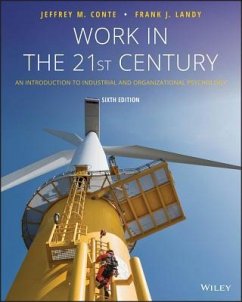Jeffrey M Conte, Frank J Landy
Work in the 21st Century
An Introduction to Industrial and Organizational Psychology
Jeffrey M Conte, Frank J Landy
Work in the 21st Century
An Introduction to Industrial and Organizational Psychology
- Broschiertes Buch
Andere Kunden interessierten sich auch für
![The Psychology of Negotiations in the 21st Century Workplace The Psychology of Negotiations in the 21st Century Workplace]() The Psychology of Negotiations in the 21st Century Workplace206,99 €
The Psychology of Negotiations in the 21st Century Workplace206,99 €![Police Psychology Into the 21st Century Police Psychology Into the 21st Century]() Police Psychology Into the 21st Century204,99 €
Police Psychology Into the 21st Century204,99 €![Virtuous Leaders: Strategy, Character, and Influence in the 21st Century Virtuous Leaders: Strategy, Character, and Influence in the 21st Century]() Richard R. KilburgVirtuous Leaders: Strategy, Character, and Influence in the 21st Century73,99 €
Richard R. KilburgVirtuous Leaders: Strategy, Character, and Influence in the 21st Century73,99 €![The Therapeutic Situation in the 21st Century The Therapeutic Situation in the 21st Century]() Mark LeffertThe Therapeutic Situation in the 21st Century189,99 €
Mark LeffertThe Therapeutic Situation in the 21st Century189,99 €![Reality Therapy for the 21st Century Reality Therapy for the 21st Century]() Robert E WubboldingReality Therapy for the 21st Century189,99 €
Robert E WubboldingReality Therapy for the 21st Century189,99 €![School Psychology for the 21st Century School Psychology for the 21st Century]() Kenneth W MerrellSchool Psychology for the 21st Century75,99 €
Kenneth W MerrellSchool Psychology for the 21st Century75,99 €![Family Therapies for the 21st century Family Therapies for the 21st century]() Alan FlashmanFamily Therapies for the 21st century28,99 €
Alan FlashmanFamily Therapies for the 21st century28,99 €-
-
-
Produktdetails
- Verlag: Wiley
- 6th edition
- Seitenzahl: 704
- Erscheinungstermin: 17. Januar 2019
- Englisch
- Abmessung: 251mm x 203mm x 28mm
- Gewicht: 1179g
- ISBN-13: 9781119493419
- ISBN-10: 1119493412
- Artikelnr.: 68046154
Hinweis: Dieser Artikel kann nur an eine deutsche Lieferadresse ausgeliefert werden.
- Herstellerkennzeichnung
- Libri GmbH
- Europaallee 1
- 36244 Bad Hersfeld
- gpsr@libri.de
Preface xx
PART 1 FUNDAMENTALS 1
What Is Industrial and Organizational Psychology? 1
Module 1.1 The Importance of I-O Psychology 2
Module 1.2 The Past, Present, and Future of I-O Psychology 16
Module 1.3 Multicultural and Cross-Cultural Issues in I-O Psychology 30
Module 1.4 The Organization of This Book 41
2 Research Methods and Statistics in I-O Psychology 49
Module 2.1 Science and Research 50
Module 2.2 Data Analysis 62
Module 2.3 Interpretation through Reliability and Validity 75
PART 2 INDUSTRIAL PSYCHOLOGY 3
Individual Differences and Assessment 86
Module 3.1 An Introduction to Individual Differences 88
Module 3.2 Human Attributes 94
Module 3.3 Foundations of Assessment 111
Module 3.4 Assessment Procedures 120
Module 3.5 Special Topics in Assessment 140
4 Job Analysis and Performance 151
Module 4.1 A Basic Model of Performance 153
Module 4.2 Extensions of the Basic Performance Model 160
Module 4.3 Job Analysis: Fundamental Properties and Practices 171
Module 4.4 Job Analysis: Newer Developments 180
5 Performance Measurement 193
Module 5.1 Basic Concepts in Performance Measurement 194
Module 5.2 Performance Rating-Substance 202
Module 5.3 Performance Rating-Process 214
Module 5.4 The Social and Legal Context of Performance Evaluation 222
6 Staffing Decisions 236
Module 6.1 Conceptual Issues in Staffing 237
Module 6.2 Evaluation of Staffing Outcomes 244
Module 6.3 Practical Issues in Staffing 251
Module 6.4 Legal Issues in Staffing Decisions 260
7 Training and Development 268
Module 7.1 Foundations of Training and Learning 269
Module 7.2 Content and Methods of Training 283
Module 7.3 Evaluating Training Programs 292
Module 7.4 Specialized Training Programs 299
PART 3 ORGANIZATIONAL PSYCHOLOGY 8
The Motivation to Work 310
Module 8.1 An Introduction to Motivation 311
Module 8.2 Classic Approaches to Work Motivation 320
Module 8.3 Modern Approaches to Work Motivation 328
Module 8.4 Practical Issues in Motivation 338
9 Attitudes, Emotions, and Work 347
Module 9.1 Work Attitudes 348
Module 9.2 Moods, Emotions, Attitudes, and Behavior 365
Module 9.3 Special Topics Related to Attitudes and Emotions 375
10 Stress and Worker Well-Being 386
Module 10.1 The Problem of Stress 387
Module 10.2 Theories of Stress 405
Module 10.3 Reducing and Managing Stress 413
Module 10.4 Violence at Work 421
11 Fairness, Justice, and Diversity in the Workplace 431
Module 11.1 Justice and Fairness 432
Module 11.2 The Practical Implications of Justice Perceptions 443
Module 11.3 Diversity 452
12 Leadership in Organizations 461
Module 12.1 The Concept of Leadership 463
Module 12.2 Traditional Theories of Leadership 475
Module 12.3 New Approaches to Leadership 483
Module 12.4 Emerging Topics and Challenges in Leadership Research 492
13 Teams in Organizations 506
Module 13.1 Types of Teams 507
Module 13.2 Input-Process-Output Model of Team Effectiveness 516
Module 13.3 Special Issues in Teams 528
14 Organizational Theory, Dynamics, and Change 535
Module 14.1 Conceptual and Theoretical Foundations of Organizations 536
Module 14.2 Social Dynamics of Organizations 549
Module 14.3 Organizational Development and Change 565
Glossary 575
References 593
Name Index 653
Subject Index 665
PART 1 FUNDAMENTALS 1
What Is Industrial and Organizational Psychology? 1
Module 1.1 The Importance of I-O Psychology 2
Module 1.2 The Past, Present, and Future of I-O Psychology 16
Module 1.3 Multicultural and Cross-Cultural Issues in I-O Psychology 30
Module 1.4 The Organization of This Book 41
2 Research Methods and Statistics in I-O Psychology 49
Module 2.1 Science and Research 50
Module 2.2 Data Analysis 62
Module 2.3 Interpretation through Reliability and Validity 75
PART 2 INDUSTRIAL PSYCHOLOGY 3
Individual Differences and Assessment 86
Module 3.1 An Introduction to Individual Differences 88
Module 3.2 Human Attributes 94
Module 3.3 Foundations of Assessment 111
Module 3.4 Assessment Procedures 120
Module 3.5 Special Topics in Assessment 140
4 Job Analysis and Performance 151
Module 4.1 A Basic Model of Performance 153
Module 4.2 Extensions of the Basic Performance Model 160
Module 4.3 Job Analysis: Fundamental Properties and Practices 171
Module 4.4 Job Analysis: Newer Developments 180
5 Performance Measurement 193
Module 5.1 Basic Concepts in Performance Measurement 194
Module 5.2 Performance Rating-Substance 202
Module 5.3 Performance Rating-Process 214
Module 5.4 The Social and Legal Context of Performance Evaluation 222
6 Staffing Decisions 236
Module 6.1 Conceptual Issues in Staffing 237
Module 6.2 Evaluation of Staffing Outcomes 244
Module 6.3 Practical Issues in Staffing 251
Module 6.4 Legal Issues in Staffing Decisions 260
7 Training and Development 268
Module 7.1 Foundations of Training and Learning 269
Module 7.2 Content and Methods of Training 283
Module 7.3 Evaluating Training Programs 292
Module 7.4 Specialized Training Programs 299
PART 3 ORGANIZATIONAL PSYCHOLOGY 8
The Motivation to Work 310
Module 8.1 An Introduction to Motivation 311
Module 8.2 Classic Approaches to Work Motivation 320
Module 8.3 Modern Approaches to Work Motivation 328
Module 8.4 Practical Issues in Motivation 338
9 Attitudes, Emotions, and Work 347
Module 9.1 Work Attitudes 348
Module 9.2 Moods, Emotions, Attitudes, and Behavior 365
Module 9.3 Special Topics Related to Attitudes and Emotions 375
10 Stress and Worker Well-Being 386
Module 10.1 The Problem of Stress 387
Module 10.2 Theories of Stress 405
Module 10.3 Reducing and Managing Stress 413
Module 10.4 Violence at Work 421
11 Fairness, Justice, and Diversity in the Workplace 431
Module 11.1 Justice and Fairness 432
Module 11.2 The Practical Implications of Justice Perceptions 443
Module 11.3 Diversity 452
12 Leadership in Organizations 461
Module 12.1 The Concept of Leadership 463
Module 12.2 Traditional Theories of Leadership 475
Module 12.3 New Approaches to Leadership 483
Module 12.4 Emerging Topics and Challenges in Leadership Research 492
13 Teams in Organizations 506
Module 13.1 Types of Teams 507
Module 13.2 Input-Process-Output Model of Team Effectiveness 516
Module 13.3 Special Issues in Teams 528
14 Organizational Theory, Dynamics, and Change 535
Module 14.1 Conceptual and Theoretical Foundations of Organizations 536
Module 14.2 Social Dynamics of Organizations 549
Module 14.3 Organizational Development and Change 565
Glossary 575
References 593
Name Index 653
Subject Index 665
Preface xx
PART 1 FUNDAMENTALS 1
What Is Industrial and Organizational Psychology? 1
Module 1.1 The Importance of I-O Psychology 2
Module 1.2 The Past, Present, and Future of I-O Psychology 16
Module 1.3 Multicultural and Cross-Cultural Issues in I-O Psychology 30
Module 1.4 The Organization of This Book 41
2 Research Methods and Statistics in I-O Psychology 49
Module 2.1 Science and Research 50
Module 2.2 Data Analysis 62
Module 2.3 Interpretation through Reliability and Validity 75
PART 2 INDUSTRIAL PSYCHOLOGY 3
Individual Differences and Assessment 86
Module 3.1 An Introduction to Individual Differences 88
Module 3.2 Human Attributes 94
Module 3.3 Foundations of Assessment 111
Module 3.4 Assessment Procedures 120
Module 3.5 Special Topics in Assessment 140
4 Job Analysis and Performance 151
Module 4.1 A Basic Model of Performance 153
Module 4.2 Extensions of the Basic Performance Model 160
Module 4.3 Job Analysis: Fundamental Properties and Practices 171
Module 4.4 Job Analysis: Newer Developments 180
5 Performance Measurement 193
Module 5.1 Basic Concepts in Performance Measurement 194
Module 5.2 Performance Rating-Substance 202
Module 5.3 Performance Rating-Process 214
Module 5.4 The Social and Legal Context of Performance Evaluation 222
6 Staffing Decisions 236
Module 6.1 Conceptual Issues in Staffing 237
Module 6.2 Evaluation of Staffing Outcomes 244
Module 6.3 Practical Issues in Staffing 251
Module 6.4 Legal Issues in Staffing Decisions 260
7 Training and Development 268
Module 7.1 Foundations of Training and Learning 269
Module 7.2 Content and Methods of Training 283
Module 7.3 Evaluating Training Programs 292
Module 7.4 Specialized Training Programs 299
PART 3 ORGANIZATIONAL PSYCHOLOGY 8
The Motivation to Work 310
Module 8.1 An Introduction to Motivation 311
Module 8.2 Classic Approaches to Work Motivation 320
Module 8.3 Modern Approaches to Work Motivation 328
Module 8.4 Practical Issues in Motivation 338
9 Attitudes, Emotions, and Work 347
Module 9.1 Work Attitudes 348
Module 9.2 Moods, Emotions, Attitudes, and Behavior 365
Module 9.3 Special Topics Related to Attitudes and Emotions 375
10 Stress and Worker Well-Being 386
Module 10.1 The Problem of Stress 387
Module 10.2 Theories of Stress 405
Module 10.3 Reducing and Managing Stress 413
Module 10.4 Violence at Work 421
11 Fairness, Justice, and Diversity in the Workplace 431
Module 11.1 Justice and Fairness 432
Module 11.2 The Practical Implications of Justice Perceptions 443
Module 11.3 Diversity 452
12 Leadership in Organizations 461
Module 12.1 The Concept of Leadership 463
Module 12.2 Traditional Theories of Leadership 475
Module 12.3 New Approaches to Leadership 483
Module 12.4 Emerging Topics and Challenges in Leadership Research 492
13 Teams in Organizations 506
Module 13.1 Types of Teams 507
Module 13.2 Input-Process-Output Model of Team Effectiveness 516
Module 13.3 Special Issues in Teams 528
14 Organizational Theory, Dynamics, and Change 535
Module 14.1 Conceptual and Theoretical Foundations of Organizations 536
Module 14.2 Social Dynamics of Organizations 549
Module 14.3 Organizational Development and Change 565
Glossary 575
References 593
Name Index 653
Subject Index 665
PART 1 FUNDAMENTALS 1
What Is Industrial and Organizational Psychology? 1
Module 1.1 The Importance of I-O Psychology 2
Module 1.2 The Past, Present, and Future of I-O Psychology 16
Module 1.3 Multicultural and Cross-Cultural Issues in I-O Psychology 30
Module 1.4 The Organization of This Book 41
2 Research Methods and Statistics in I-O Psychology 49
Module 2.1 Science and Research 50
Module 2.2 Data Analysis 62
Module 2.3 Interpretation through Reliability and Validity 75
PART 2 INDUSTRIAL PSYCHOLOGY 3
Individual Differences and Assessment 86
Module 3.1 An Introduction to Individual Differences 88
Module 3.2 Human Attributes 94
Module 3.3 Foundations of Assessment 111
Module 3.4 Assessment Procedures 120
Module 3.5 Special Topics in Assessment 140
4 Job Analysis and Performance 151
Module 4.1 A Basic Model of Performance 153
Module 4.2 Extensions of the Basic Performance Model 160
Module 4.3 Job Analysis: Fundamental Properties and Practices 171
Module 4.4 Job Analysis: Newer Developments 180
5 Performance Measurement 193
Module 5.1 Basic Concepts in Performance Measurement 194
Module 5.2 Performance Rating-Substance 202
Module 5.3 Performance Rating-Process 214
Module 5.4 The Social and Legal Context of Performance Evaluation 222
6 Staffing Decisions 236
Module 6.1 Conceptual Issues in Staffing 237
Module 6.2 Evaluation of Staffing Outcomes 244
Module 6.3 Practical Issues in Staffing 251
Module 6.4 Legal Issues in Staffing Decisions 260
7 Training and Development 268
Module 7.1 Foundations of Training and Learning 269
Module 7.2 Content and Methods of Training 283
Module 7.3 Evaluating Training Programs 292
Module 7.4 Specialized Training Programs 299
PART 3 ORGANIZATIONAL PSYCHOLOGY 8
The Motivation to Work 310
Module 8.1 An Introduction to Motivation 311
Module 8.2 Classic Approaches to Work Motivation 320
Module 8.3 Modern Approaches to Work Motivation 328
Module 8.4 Practical Issues in Motivation 338
9 Attitudes, Emotions, and Work 347
Module 9.1 Work Attitudes 348
Module 9.2 Moods, Emotions, Attitudes, and Behavior 365
Module 9.3 Special Topics Related to Attitudes and Emotions 375
10 Stress and Worker Well-Being 386
Module 10.1 The Problem of Stress 387
Module 10.2 Theories of Stress 405
Module 10.3 Reducing and Managing Stress 413
Module 10.4 Violence at Work 421
11 Fairness, Justice, and Diversity in the Workplace 431
Module 11.1 Justice and Fairness 432
Module 11.2 The Practical Implications of Justice Perceptions 443
Module 11.3 Diversity 452
12 Leadership in Organizations 461
Module 12.1 The Concept of Leadership 463
Module 12.2 Traditional Theories of Leadership 475
Module 12.3 New Approaches to Leadership 483
Module 12.4 Emerging Topics and Challenges in Leadership Research 492
13 Teams in Organizations 506
Module 13.1 Types of Teams 507
Module 13.2 Input-Process-Output Model of Team Effectiveness 516
Module 13.3 Special Issues in Teams 528
14 Organizational Theory, Dynamics, and Change 535
Module 14.1 Conceptual and Theoretical Foundations of Organizations 536
Module 14.2 Social Dynamics of Organizations 549
Module 14.3 Organizational Development and Change 565
Glossary 575
References 593
Name Index 653
Subject Index 665








